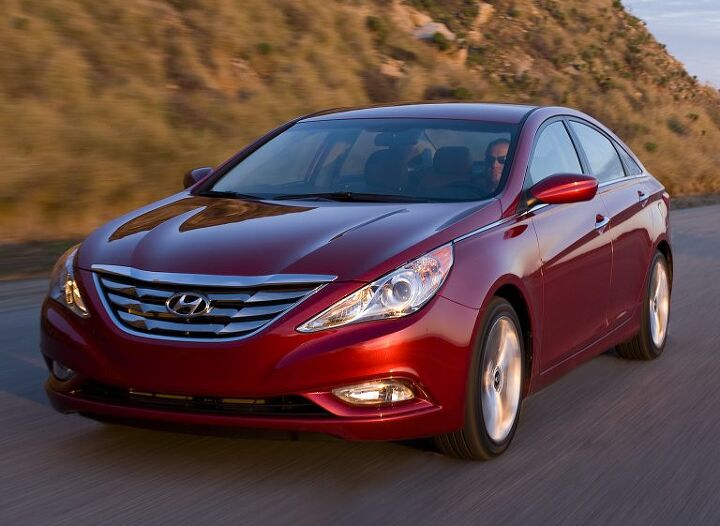Hyundai/Kia Issue Recalls Over Fuel Line Leak, Fire Risk

Hyundai is reportedly recalling around 207,000 Sonata models in the U.S. over a fuel hose issue that could create a fire hazard. Kia issued a recall on 142,000 Optima sedans and 51,000 Sedonas minivans for the same issue. While there doesn’t appear to be any injuries stemming from the problem, Hyundai Motor Group has notified the National Highway Traffic Safety Administration that the vehicles could incur a fuel leak that runs the risk of starting fires within the engine compartment.
The source of the issue has not been discovered; the NHTSA recall report stipulates that the manufacturer “believes the material used to produce the fuel feed line might be more susceptible to heat under certain vehicle operating conditions.” Be on the lookout for a less responsive motor, engine warning lights and the faint aroma of gasoline.
Problems are reportedly isolated to the fuel feed line connecting the low pressure fuel pump to the direct injection fuel pump in the subject vehicles. Hyundai said it could could develop a small crack over time due to ambient heat in the engine compartment. A spokesperson informed us that no actual fires have been reported and that the cars should be safe to drive while the automaker works out a solution.
The Center for Auto Safety released a letter last month (when the Kia models were called back) suggesting the recall was long overdue and referenced its own petition as evidence. “Today, 364 days since we called on Congress to investigate Kia and Hyundai for failure to recall these defective cars, these manufacturers continue to string out consumers when it comes to the possibility of their engine failing and their car exploding,” said Jason Levine, executive director of the group. “It is long past due for these almost 200,000 vehicles to have been recalled, and in fact, it is almost 2 years since the Center for Auto Safety originally petitioned for exactly such action.”
From the Center for Auto Safety:
Beginning in June 2018, the Center petitioned NHTSA to open a defect investigation into all 2011-2014 Kia Optima, Sorento and Hyundai Sonata and Santa Fe vehicles based on 120 owners reporting non-crash fires involving their vehicles. In July 2018, the Center added the 2010-2015 Kia Soul to our petition. In April 2019, NHTSA finally opened an investigation. In the interim, there have been a series of related recalls for some, but not all, of the vehicles originally identified by the Center. An additional 3.7 million vehicles covering even more model years have been subjected to a “product improvement campaign,” by Hyundai and Kia which includes a software update and installation of a knock sensor to detect the type of engine failure that leads to dangerous conditions, including risk of fire.
While the Center for Auto Safety definitely thinks this is a bigger issue, vehicles affected by the official recall campaigns include Kia Optimas from the 2013-14 model year, Sedonas from 2011-12 and Hyundai Sonatas from 2013-14. The supplier of the offending Sonata part is said to be Hanil Tube USA, while the Sedona recall documents name Delphi Powertrain Systems Korea as its supplier.
Dealers and owners will start seeings notifications in their mailbox this April.
[Image: Hyundai]

A staunch consumer advocate tracking industry trends and regulation. Before joining TTAC, Matt spent a decade working for marketing and research firms based in NYC. Clients included several of the world’s largest automakers, global tire brands, and aftermarket part suppliers. Dissatisfied with the corporate world and resentful of having to wear suits everyday, he pivoted to writing about cars. Since then, that man has become an ardent supporter of the right-to-repair movement, been interviewed on the auto industry by national radio broadcasts, driven more rental cars than anyone ever should, participated in amateur rallying events, and received the requisite minimum training as sanctioned by the SCCA. Handy with a wrench, Matt grew up surrounded by Detroit auto workers and managed to get a pizza delivery job before he was legally eligible. He later found himself driving box trucks through Manhattan, guaranteeing future sympathy for actual truckers. He continues to conduct research pertaining to the automotive sector as an independent contractor and has since moved back to his native Michigan, closer to where the cars are born. A contrarian, Matt claims to prefer understeer — stating that front and all-wheel drive vehicles cater best to his driving style.
More by Matt Posky
Latest Car Reviews
Read moreLatest Product Reviews
Read moreRecent Comments
- 1995 SC How bout those steel tariffs. Wonder if everyone falls into the same camp with respect to supporting/opposing them as they did on the auto tariffs a few weeks ago. Doubt it. Wonder Why that would be?
- Lorenzo Nice going! They eliminated the "5" numbers on the speedometer so they could get it to read up to 180 mph. The speed limit is 65? You have to guess one quarter of the needle distance between 60 and 80. Virtually every state has 55, 65, and 75 mph speed limits, not to mention urban areas where 25, 35, and 45 mph limits are common. All that guesswork to display a maximum speed the driver will never reach.
- Norman Stansfield Automation will make this irrelevant.
- Lorenzo Motor sports is dead. It was killed by greed.
- Ravenuer Sorry, I just don't like the new Corvettes. But then I'm an old guy, so get off my lawn!😆


































Comments
Join the conversation
I am hesitant to say that I am still hesitant to buy a Hyundai because I don’t feel ai can reliably trust that any vehicle I buy will be safe and reliable. I like what they are building and I keep wanting to think that they are a Japanese-car equivalent, but every time I have just about convinced myself of that... something like this pops up. Or this one: Hyundai Motor America is recalling certain 2018 Hyundai Santa Fe and Santa Fe Sport vehicles. The steering wheel assembly may break, possibly resulting in the steering wheel separating from the steering column while driving. Or this one: Due to an electronic stability control (ESC) sensor malfunction, the brakes for one or more wheels may be applied unexpectedly and the engine power may be reduced. These symptoms will be accompanied by illumination of the ESC indicator lamp in the instrument cluster.If the one or more of the brakes are inappropriately applied, control of the vehicle may be lost, increasing the risk of a crash. I know that everybody has recalls and that I am just being silly but...I can’t quite pull the trigger on one.
"Kia engineering"... is that an oxymoron? I'm exaggerating, of course, but fuel lines (and brake lines) are not the place to use barely-enough specification product, then bid it out to the lowest-cost Chinese supplier. Unfortunately, consumers have very short memories, and if the monthly payment is low enough, and the paint shiny enough, the problem of burning Kias won't amount to a hill of beans.